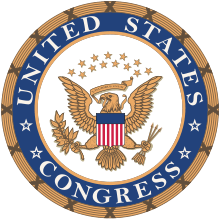Congressional Gaming Caucus
Congressional Gaming Caucus | |
|---|---|
 | |
| Republican Co-Chair | Mark Amodei (acting) (R-NV) |
| Democratic Co-Chair | Bennie Thompson (D-MS) |
| Political position | Bipartisan |
| Colors | None Official (Gray Unofficial) |
| Seats in the House |
12 / 435 |
The Congressional Gaming Caucus is a Congressional Member Organization within the United States House of Representatives, as approved by the Committee on House Administration.
History of the Caucus
The Congressional Gaming Caucus was originally formed in the 20th Century, as a means for Gambling and Casino Companies to have their voices heard on Congressional Issues. However, since many states at the time had imposed a ban on gambling, the Congressional Caucus went under the name of the Congressional Gaming Caucus. The Caucus was dissolved in the latter half of the 20th Century, but continued to exist informally until it was officially reestablished in 2013 by Rep. Joe Heck (R-NV) and Bennie Thompson (D-MS). The new Congressional Gaming Caucus, while still focusing on gambling and casinos, now has an additional focus on electronic video games and board games.[1][2]
Information and purpose
According to Co-Chair and founding member Joe Heck (R-NV), the purpose of the Congressional Gaming Caucus is to:[1]
- Address employment and economic issues pertaining to the gaming industry, as well as working with the gaming industry to find solutions.
- To promote training and skills improvement which can make jobs available to constituents and economically empower gaming communities;
- Interacting with gaming companies and their representatives to hear their concerns and to share Member’s concerns
- Holding Member and staff level meetings on a regular basis to assure the effectiveness, viability, and relevance of the Caucus.
Membership
As of the 115th Congress, the Congressional Gaming Caucus has 12 members.[2] With only 12 members, the Congressional Gaming Caucus is one of the smallest bi-partisan caucuses in the United States Congress.

Current Members
- Rep. Mark Amodei (R) (NV-2)
- Rep. Frank LoBiondo (R) (NJ-2)
- Rep. Tom Reed (R) (NY-23)
- Rep. Paul Gosar (R) (AZ-4)
- Rep. Scott Tipton (R) (CO-3)
- Rep. Pat Tiberi (R) (OH-12)
- Rep. Leonard Lance (R) (NJ-7)
- Rep. Bennie Thompson (D) (MS-2)
- Rep. Dina Titus (D) (NV-1)
- Rep. Sheila Jackson Lee (D) (TX-18)
- Rep. Cedric Richmond (D) (LA-2)
- Rep. Steve Cohen (D) (TN-9)[3]
Former Members
- Fmr. Rep. Michael Grimm (NY-15)-Was sentenced to prison.[4]
- Fmr. Rep. Aaron Schock (IL-18)- Resigned due to an investigation around corruption charges.[5]
- Fmr. Rep. Shelley Berkley (NV-1)- Unsuccessfully ran for Senate in 2012 instead of defending her seat.[6]
- Fmr. Rep. Steven Horsford (D) (NV-4)- Lost his 2014 reelection bid.
- Fmr. Rep. Jon Runyan (R) (NJ-3)- Chose not to seek reelection in 2014.
- Fmr. Rep. Ann Kirkpatrick (AZ-1)- Lost her 2016 reelection bid.
- Fmr. Rep. Joe Heck (R) (NV-3)- Unsuccessfully ran for Senate in 2016 instead of defending his seat.
Controversy
In recent years, the Caucus has received scrutiny from members of the press and public for its shady connections to the Gambling and Casino industry. Some examples include:
- In 2007, it was reported that Former Co-Chair of the Congressional Gaming Caucus, Rep. Shelley Berkley (NV-1), received over $161,000 for her 2006 reelection campaign from various gambling and Casino Special Interest Groups.[7]
- In 2015, the Caucus lobbied the IRS to cancel its plans to lower the tax-reporting threshold for gambling earnings, a ruling intended to prevent tax fraud, despite the IRS receiving over 10,000 signatures requesting the measure to be enacted. In the letter to the Internal Revenue Service, the Caucus stated: "We strongly believe the IRS should not consider any reduction of this reporting threshold, as any lowering from $1,200 would have significantly negative impacts on casino operations and customers. Any reduction in this threshold would dramatically raise costs to comply, decrease gaming revenue due to more frequent slot machine 'lock-ups,' and would greatly increase the burden workload for IRS."[8]
- From 2007 to 2017, Representative Bennie Thompson (MS-2) has received $97,672 from MGM Corporations, and $69,525 from Caesars Entertainment, Inc.[9]
- From 2007 to 2017, Representative Dina Titus has received $130,050 from MGM Resorts International, and $38,850 from Caesars Entertainment, Inc.[10]
- From 2007 to 2014, Representative Steven Horsford has received $95,150 from MGM Resorts International, and $24,000 from Boyd Gaming in campaign contributions. [11]
References
- 1 2 "Join the Congressional Gaming Caucus" (PDF). Heck.house.gov. Retrieved 2016-11-28.
- 1 2 "Congressional Gaming Caucus | Congressman Joe Heck". Heck.house.gov. Retrieved 2016-11-28.
- ↑ "Steve Cohen Caucus". Retrieved 11 December 2016.
- ↑ "Michael Grimm, disgraced Staten Island congressman, to begin prison sentence for filing false tax returns". NY Daily News. 22 September 2015. Retrieved 8 May 2017.
- ↑ Mike Debonis (17 March 2015). "Rep. Aaron Schock announces resignation in wake of spending probe". Washington Post. Retrieved 8 May 2017.
- ↑ "BERKLEY, Shelley, (1951 - )". Biographical Directory of the United States Congress. United States Congress. Retrieved 9 May 2017.
- ↑ "Congressional Caucuses: Something for every Special Interest". politico. Retrieved 10 March 2017.
- ↑ "Casinos, gamblers, legislators, oppose lower threshold for reporting slot winnings to IRS". Cleveland.com. Retrieved 10 March 2017.
- ↑ "Bennie Thompson Top Donors". The Center for Responsive Politics. Retrieved 10 March 2017.
- ↑ "Dina Titus Top Donors". The Center for Responsive Politics. Retrieved 10 March 2017.
- ↑ "Steven Hornsford Top Donors". The Center for Responsive Politics. Retrieved 10 March 2017.